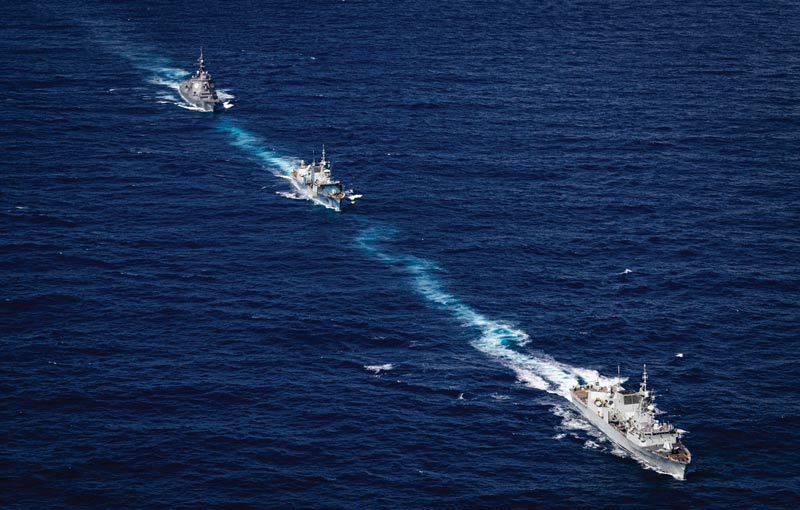
Foreign Affairs Minister Mélanie Joly released the federal government’s policy on the Indo-Pacific on Nov. 27, 2022. Making the point that Canada has clear national interests in the area, Joly’s paper noted that half of new Canadians come from the Indo-Pacific and one in five Canadians have ties to the region, including Chinese, Indian, Filipino, Vietnamese, Korean and Japanese Canadians. It clearly makes sense for Canada to seek to broaden ties, increase trade and cast as much power as it can muster into an area of the globe that’s certain to become both more important and more affluent in the next several decades.
It is, of course, China that is of greatest concern to Ottawa today, and the statement describes China as an “increasingly disruptive global power.” Given that Prime Minister Trudeau’s “sunny ways” were expected to create harmony with Beijing when he took power in 2015, this is a significant change—and a belated recognition of reality.
Even so, Canadians should understand that this policy statement came about because of pressure from U.S. President Joe Biden’s administration. As Jonathan Berkshire Miller, director of the Macdonald-Laurier Institute’s Indo-Pacific program, observed, the statement “does not mean we agree with the Americans on everything, but what happens in the Indo-Pacific, as it pertains to the United States, is existential for Canada as well.
“For instance, if the U.S. is involved in significant competition or conflict in the region, Canada is intimately involved, whether it is through our Five Eyes relationship, the fact that we are neighbours, our trade dependency with the U.S., etc. It does not mean we need to mimic the Americans on all things China, but we do need to recognize that this is our reality.”
Still, the policy is only worth the paper it’s written on if it points to the major issues at hand and is followed by concrete changes. Canadians will see about the policy’s implementation over the next few years, but the statement did overlook some serious issues.
China’s Xi Jinping regime has been committing genocide against the country’s Uyghur Muslim population, putting adults in “re-education” camps and imposing draconian controls upon them. This drew only two brief mentions in the government statement. China’s large diplomatic representation in Canada—it has nearly as many accredited personnel in its Canadian embassy and consulates as the United States and Great Britain do—meanwhile wasn’t noted.
What are these diplomats doing? If we believe Canada’s security and intelligence agencies, they have been spying on Canadian industry and seeking dual-use military technology, work on artificial intelligence and super computers, and successfully suborning politicians and other influential individuals, both Chinese Canadian and otherwise.
And, despite the prime minister’s claim that he was not briefed on election interference by Chinese diplomats in 2019 and 2021, the Canadian Security Intelligence Service and the RCMP have publicly testified before parliamentary committees that they did so.
As former diplomat Charles Burton has said, the Chinese Communist Party’s United Foreign Work Department “has an explicit policy of encouraging persons of ethnic Chinese origin to participate politically in democratic legislatures and seeks to influence important individuals who participate in the policy process in democratic countries, including Canada.
“They want politicians in Canada, while they are in positions of public trust, to not support policies that go against China’s overall interests and international agenda. The party seeks to make individuals of influence feel that they may be rewarded after retirement, which could include appointments to firms that do business with China.”
Not a word of this deliberate subversion of Canadian democracy appeared in the government’s policy statement.
Even China’s pressure on Taiwan, the independent offshore nation that Beijing claims is theirs, drew scant notice. If there is a single flashpoint in the Indo-Pacific that could lead to a major conflict that will surely involve Canada, it is this.
One might have expected Ottawa to pledge to increase its military role in the region—and it did: one frigate currently based in the Atlantic will be shifted to the Pacific. Beijing must be shaking in its boots. But the statement did not push for Canada to be included in the U.S.-Australia-Japan-India security “quad” or the U.S.-Britain-Australia Indo-Pacific defence accord. Given the state of Canada’s military, the country might have little to contribute today, but a pledge to spend much more might possibly have secured a seat at the international table for Canada. Again, there was little about such intentions.
There are, however, indications Ottawa might be serious about Chinese interference in Canada: the government announced plans to toughen up its foreign investment rules, which could prevent Chinese firms from buying Canadian rare mineral mining companies or grabbing intellectual property; in mid-November 2022, a multi-party group of MPs on the procedure and House affairs committee agreed to investigate the allegations of election interference; and Ottawa has launched an effort to seek opinions on establishing a foreign agent registry that would make former politicians, corporate lawyers and academics working for other nations in Canada declare such roles. All these initiatives would be progress.
There are, however, indications Ottawa might be serious about Chinese interference in Canada.
Similarly, the RCMP is investigating the role of Chinese police stations in Toronto and elsewhere in the country that claim to be helping Chinese nationals in Canada, among other services, renew their driver’s licences. And Global Affairs Canada has apparently asked the Chinese ambassador to explain this unauthorized intrusion.
Naturally, Beijing was not pleased with these moves or with the tone of Joly’s statement. It was perhaps not “nuanced” enough. If so, the statement hit the right notes, even if it was less detailed than some would prefer.
Thus, Canada’s Indo-Pacific Strategy is a start. As Miller noted, “If you compare where the government was standing on this issue three or five years ago with the document that was just released, we have come a long way.”
Advertisement












